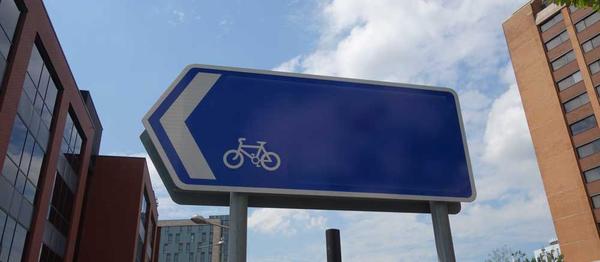
“In Tower Hamlets there is actually a cycle path on the pavement with parking meters running through the centre. That’s a slalom, not a cycle route. We need to get much better.”
The words of an exasperated London cycle campaigner? No – this is the new Minister for Cycling, Robert Goodwill, speaking at a little-reported event this week.
Speaking at the ‘Cycling Networks Fit For Growth’ conference in Leeds, the Minister bemoaned the current state of Britain’s cycling infrastructure, and promised to do better. He said:
“Over the past 20 years or so a great deal of money has been spent on cycling infrastructure. But frankly a lot of it has been wasted. Poor quality infrastructure has been put in place which is inadequate to give people confidence to cycle. With apologies to Talking Heads, all too often we’ve built ‘the cycle path to nowhere’.”
And in a welcome departure from recent trends, he promises “to move beyond incremental improvement”.
Better city cycling
Instead, he says the country should aim for “a continuous cycle network which will make cycling an easy choice for shorter journeys”.
“We have to move beyond thinking about transport in silos to planning transport networks. That means putting cycling provision in, designed by people who actually understand cycling, from the start.”
Safety, he said, was key to this.
“Most cyclists are still young men: two-thirds of women say the roads are too dangerous to cycle on. If we are to get real shifts in behaviour, we will also have to make cycling something everyone, particularly women, older people and children, can aspire to do as the easiest way of getting about locally.”
Goodwill also reiterated recent Government changes intended to make cycling easier, listing 20mph zones; contraflow cycle lanes and ‘no entry except cycles’ signs; and trials including shared-use zebra crossings, ‘elephant’s footprint’ markings at signalised junctions, better priority at junctions, and cycling filter traffic lights. But he conceded this was not enough, telling his local council audience, “working together, we need to do more”.
Convincing motorists
In one refreshing passage, he took a swipe at the BBC’s recent portrayal of driver-cyclist conflict.
“Only last week the BBC’s ‘One Show’ was describing it as a battle between drivers and cyclists on Britain’s streets. Nothing could be further from the truth.
“The average car trip is just 8.5 miles. That means a large number of car journeys will be far shorter, a distance most people could easily manage by bike. So we need a simple, consistent message: the more people cycling the fewer jams for everyone else. For if we do nothing, traffic jams will increase by around 30% in the period to 2025.”
He pointed to other car-dominated cities that had been tamed for bikes – not the usual suspects of Copenhagen and Amsterdam, but rather New York City, Nantes and Seville.
“These places have doubled or quadrupled cycling in the past decade by putting in place high quality cycling infrastructure. 10 years ago they had cycle rates lower than in most UK towns. We can make similar changes in UK cities.”
Concluding, he suggested that 2014 could become Britain’s year of cycling.
“Next year we will host the Tour de France. There will be a lot of attention on cycling over the next few months. Let’s use that opportunity to start a cycling revolution.
“Where there are barriers in your [local councils’] way, I want to help remove them. Where the Department for Transport can help you do more, we will.”
Robert Goodwill, of course, is a member of the Government that abolished Cycling England, is ploughing more money into new roads than at any time over the last 20 years, cancelled plans for an ‘Office of Active Travel’, and has this week announced a climb-down on charging tolls on the A14. Many will be sceptical that his words will be backed up with action. But this is arguably the most encouraging speech by a cycling minister since the Coalition came to power – and could anticipate better things to come in 2014.



